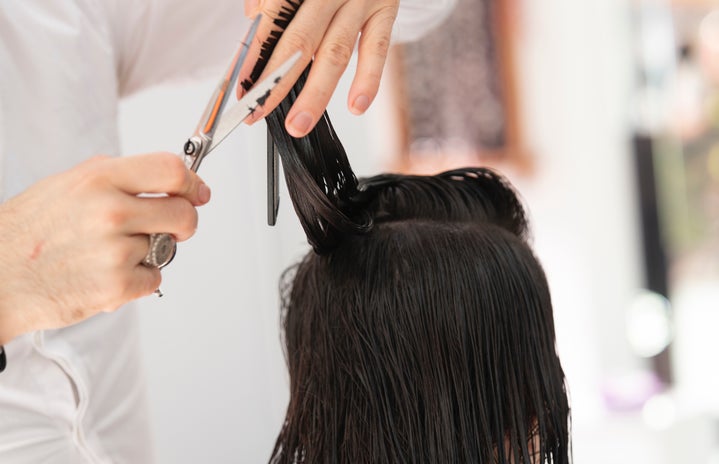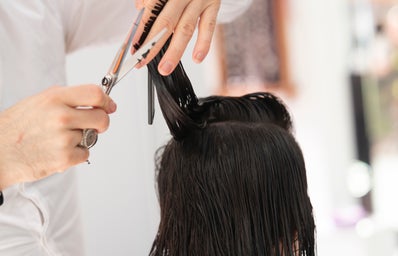“This is not me on a feminist-brigade,” I thought to myself as I tried to sit up straight in the hairdresser’s chair. “This is not me challenging my femininity.” Fine, but why did this moment—cutting my hair all the way up to my shoulders—feel so monumental? Why did my life feel like it would be made up of two chapters: pre-haircut and post-haircut? Why was I exhilarated and terrified all at the same time?
After making the bold decision of getting a pixie-cut right before my high school graduation photos almost four years ago, I had let my hair grow out to a length that exceeded anything I’d had since middle school. Hitting my mid-back, I was beginning to become overwhelmed with how high-maintenance my already fussy hair was starting to be. This growth, however, felt like such an accomplishment. “I can’t cut it now,” I’d tell myself. “You’ve already made it this far.”
If I’m being totally honest, I absolutely hate the way that I look with longer hair, and I’d known this for quite a while. It lacked volume, didn’t frame my face correctly no matter how many styles of bangs I tried, and the frizz was untameable. I’d cut it several times over the years, but this time things were different. As my hair grew, so did… well everything else. Since the beginning of the pandemic, I’d gained a considerable amount of weight. My self-image is, to put it mildly, awful, and this absolutely did not help. My face—along with the rest of my body—was noticeably rounder, and the fashion gods have always testified that short hair would not frame a round face correctly. So I held off, let my hair grow, and tried losing weight.
I’d convinced myself that I needed to get skinny before I could cut my hair. Afterall, it wouldn’t look good on the new fluff I’d acquired. Thus was the beginning of my confidence absolutely plummeting, even when I thought I’d reached rock bottom. Spoiler alert: I did not lose any weight. I had a new body, new hair, and I hated all of it. I needed something to change overnight, and as you might know, bodies don’t do that. Hair, however, can! And still, I decided to adhere to what I believed was the natural order of things: be thin, then cut the hair.
Until one day, as I sat on the campus bus, I took out my phone and absentmindedly scheduled an appointment at a salon I’d never been to, with a woman I’d never met, and gave not a single thought to it. I’m not sure what I was thinking in that moment, but I’d like to think that my higher-self took the wheel, shoved little old me out of the driver’s seat, and said buckle up. Next thing I knew, it was a week later, and I was in the hairdresser’s chair.
“This is not me on a feminist-brigade.” I stood up, looked in the mirror, and for the first time in years felt like I recognized myself. “That’s me! This is what I’m supposed to look like!” The woman sweeping up my hair off the ground gave me a puzzled smile, and I might have been embarrassed before, but I knew how important this was to me.
I’ve wallowed in my insecurities for years, and would have done anything to be free. Except I was doing nothing to free myself of them; I was simply bending to them. My hair, sitting just on top of my shoulders, makes me feel beautiful and confident, but beauty and confidence were not things that I felt deserving of as long as I occupied my body the way it is now. I’d believed that the key to deservance would be in loose-fitting clothes and a teeny tiny waist. I’d believed that my thoughts about myself were happening to me.
I can’t help but look back in regret on the last few months; if only I’d known that the secret to happiness was a pair of scissors, I could have saved myself a lot of heartache. But regret isn’t all that productive, and I look at the girl I was with long hair as a lesson of how much power I have over my own life. My old hair ties now lay in the bottom drawer of my dresser, “I won’t be needing those for a while,” and if I ever need them again, I’ll remember the freedom I felt when I finally stored them away.


